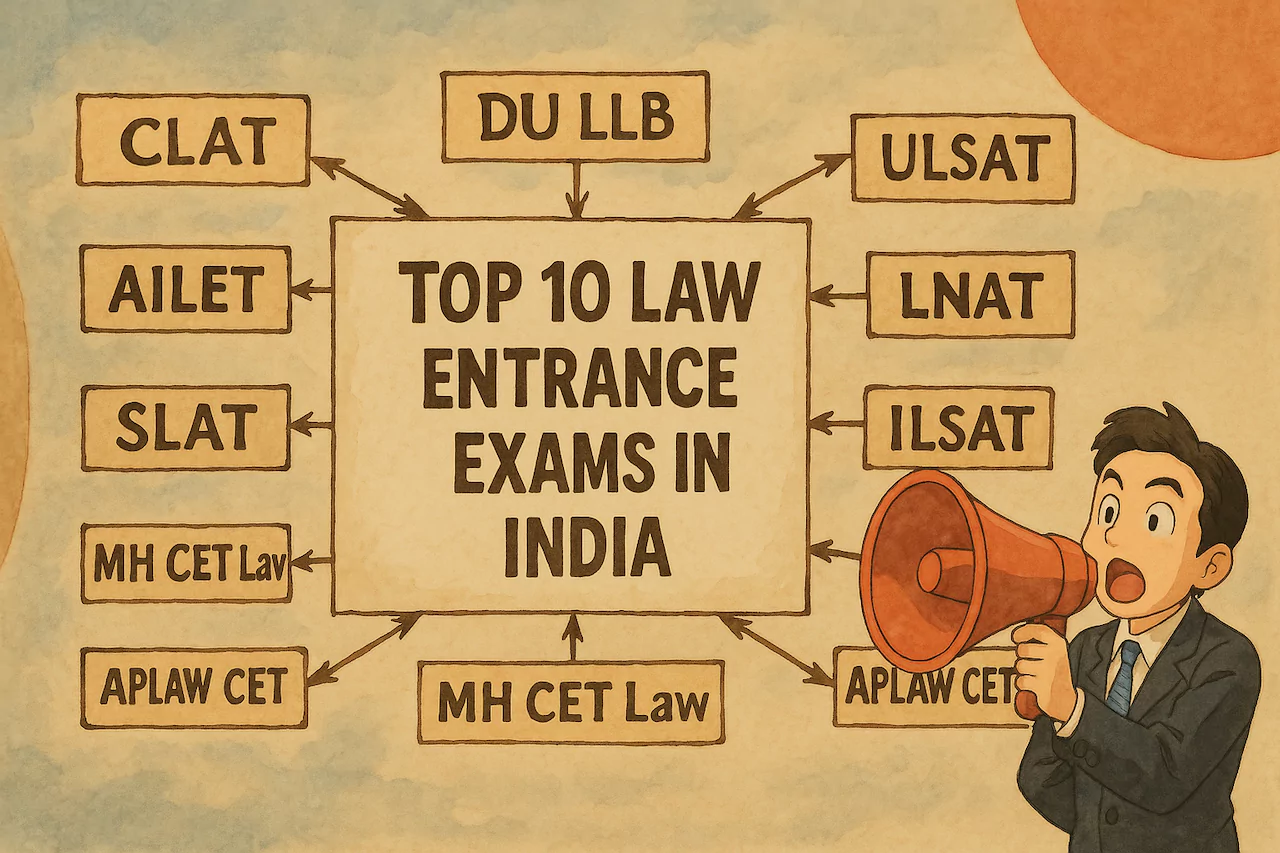This article will completely focus on the Top 10 LAW entrance exams in India. To get admission into the Top Law institutes in India, students have to go through a series of examinations. There are many types of entrance exams that happen in India for getting into the Top law institutes. Students who are planning to pursue law should definitely check this article in detail, as it discusses in detail the Top 10 LAW entrance exams in India. Let’s see in detail in this article.

Also learn: Toughest Exams in India
Top 10 LAW Entrance Exams in India
In India, becoming a lawyer begins with passing a series of admission tests, which provide access to top law schools and government positions in the legal field. The two primary categories of Indian law examinations are government law exams, which are used to get highly sought-after posts in government agencies, and law entrance exams, which grant admission to law programs at the undergraduate and graduate levels of study.
Various capabilities, including becoming a lawyer, begin with passing a series of admission tests. These tests assess skills such as legal thinking, general awareness, analytical abilities, and language proficiency, using a variety of exam formats. A career in law encompasses a wide range of activities because it can be pursued as a government law officer or within the courts.
List of Top 10 LAW Entrance Exams in India 2025
- CLAT
- AILET
- SLAT
- LSAT India
- DU LLB
- MH CET Law
- ULSAT
- LNAT
- ILSAT
- APLAW CET
1) Common Law Admission Test (CLAT):
The first in the list of the Top 10 LAW Entrance Exams in India is CLAT. CLAT is a national-level law entrance exam. It offers the UG and PG Law Courses in National Law Universities. The Eligibility for giving this exam is for UG courses, Students should pass 10+2 with the minimum marks of 45%, and for PG courses, Students should have LLB degree or some equivalent degree with minimum marks of 50%. This is one of the best on the list of the Top 10 LAW Entrance Exams in India.
CLAT Exam comprises of segments such as Current Affairs, English, Logical Reasoning, Legal Reasoning, Logical Ability and Quantitative Techniques. It is one of the most often and widely taken entrance exam by the students who wants to do law in India, and awarding students gets seat in the National Law university through this Exam.
2) All India Law Entrance Test (AILET):
AILET is on the number 2nd on the list of the Top 10 LAW Entrance Exams in India. All India Law Entrance Test is organized by National Law University, situated in Delhi. It is a National level Law Entrance Exam. Through this Exam students can opt for 2 courses UG (BA LLB) and PG (LLM). Eligibility Criteria of UG courses are that the candidates must pass 10+2 with the minimum marks of 50% from the prestigious institute, and for PG courses the candidates must have a UG LLB degree with minimum marks of 55% or some equivalent similar degree.
The pattern for this exam is General Knowledge, Logical Aptitude, Logical Reasoning, English, and Mathematics. National Law University, Delhi or NLU, Delhi admits the students in the basis of the score in All India Law Entrance Test (AILET), it does not consider admission based on the CLAT Scores. AILET is the only entrance that is being considered for this elite university.
3) Symbiosis Law Admission Test (SLAT):
The next on the list of the Top 10 LAW Entrance Exams in India is SLAT. Symbiosis Law Admission Test is conducted by Symbiosis International a deemed university. It offers only UG level law courses. The eligibility criteria for this exam is that the candidates should pass 10+2 with the minimum marks of 45% from any recognized board. This is one of the best on the list of the Top 10 LAW Entrance Exams in India.
The examination patters mainly covers different sections from Legal Reasoning, Reading Comprehension, Logical Reasoning, General Knowledge, and Analytical Reasoning. Through SLAT, a candidates can get entry into one of the Top Private Law School in India, and that is and esteemed Symbiosis Law School.
4) Law School Admission Test India (LSAT India):
LSAT is on the number 4th on the list of the Top 10 LAW Entrance Exams in India. Law School Admission Test India is an International law entrance exam, especially for the benefit of Indian students. This exam is conducted by Law School Admission Council. It intakes for both Undergraduate and Postgraduate Courses. For the Undergraduate courses, the student has the pass 10 + 2 or equivalent with a prestigious institution with the minimum score of 50%.
For the Postgraduate courses, the student should have successfully passed graduation from any stream. The pattern of the exam for this is mainly logical reasoning, Reading comprehension, and analytical reasoning. LSAT is accepted or considered by most of the top private law schools in India.
5) Delhi University LLB Entrance Exam (DU LLB):
The next on the list of the Top 10 LAW Entrance Exams in India is DU LLB. It is for postgraduate law education, it’s a type of University-level entrance examination. It is conducted by University of Delhi. The courses offered are LLB. Students who have completed graduation from any of the recognized university with any of the stream, and passed with the minimum of 50% marks are eligible to give this examination. This is one of the best on the list of the Top 10 LAW Entrance Exams in India.
The exam pattern typically includes Legal Aptitude, Logical Reasoning, English, and General Knowledge. The department of the Faculty of Law is considered and is one of the most and highly reputed law schools in India.
6) Maharashtra Common Entrance Test Law (MH CET Law):
MH CET is on the number 6th on the list of the Top 10 LAW Entrance Exams in India. Maharashtra Common Entrance Test Law is a State level law entrance examination. It is Conducted by the State Common Entrance Test Cell. It provides both Undergraduate and Postgraduate degree. The eligibility for the UG course is that the student should pass 10 + 2 examination with the minimum of 45% marks.
The examination pattern typically includes General Knowledge, Legal Aptitude, English and Logical Reasoning. In Maharashtra, the MH CET Law is a prerequisite for admission to both public and private law schools.
7) University of Petroleum and Energy Law School Admission Test – ULSAT
ULSAT is on the number 7th on the list of the Top 10 LAW Entrance Exams in India. University of Petroleum and Energy Law School Admission Test is entrance level examination for LLB (3 years and 5 years), LLM courses. These courses are being offered by University of Petroleum and Energy Studies. The eligibility criteria for this is that the student has to pass class 10 and 12th with the minimum marks of 50%.
It is an online test, duration is 2 hours. The exam includes the questions from the following sections Legal General Knowledge, Quantitative & Numerical Ability, Language Comprehension, Legal Aptitude, and Logical Reasoning.
8) Law National Aptitude Test – LNAT
The next on the list of the Top 10 LAW Entrance Exams in India is LNAT. Law National Aptitude Test helps students to understand whether Law is the correct career choice for them or not, and also along with the student it helps university to understand whether the student will able to succeed in the law course or not.
LNAT basically tests the students verbal skills, reasoning skills, Ability to Understand and Interpret information, Ability to analyse information and take the proper conclusion.
9) ICFAI Law School Admission Test – ILSAT
The next on the list of the Top 10 LAW Entrance Exams in India is ILSAT. The ICFAI Law School Admission Test is known as the ILSAT. It serves as an entrance exam for ICFAI Law School undergraduate and graduate legal programs. The ICFAI Foundation for Higher Education (IFHE), located in Hyderabad, administers the test.
Admission to courses like BA LLB and BBA LLB at ICFAI Law School is determined by the ILSAT. The test is computer-based and self-directed. English, logical reasoning, legal reasoning, GK/current affairs, and analytical reasoning are among the topics covered in the test. This is one of the best on the list of the Top 10 LAW Entrance Exams in India.
10) APLAW CET
The last on the list of the Top 10 LAW Entrance Exams in India is APLAW CET. For admission to legal programs provided by Andhra Pradesh Universities and their affiliated colleges, the Andhra Pradesh State Council of Higher Education administers the state-level entrance exam known as APLAWCET, which is administered by Sri Padmavathi Mahila Viswavidyalayam, Tirupati.
Conclusion
Law exams in India are hence entry points to a wide range of legal professions, from study at prestigious law schools to some of the highest paying jobs in the public sector and government. from entry exams at the national level, like AILET and CLAT. Excellent preparation in legal acumen, reasoning, and general awareness is required for each exam. When taken strategically, the tests provide gratifying chances for individuals to advance in the fields of public law, corporate law, or the court.
FAQs on Top 10 LAW Entrance Exams in India 2025
What distinctions exist between AILET and CLAT?
While AILET is exclusive to NLU Delhi, CLAT is administered by the Consortium of NLUs to admit students to other NLUs. Both are national exams, although they have different application procedures and curricula.
Do government positions require passing any legal exams?
In addition, several government law examinations, including the Judicial Services Exam, the Public Prosecutor Exam, and the Assistant Public Prosecutor (APP) Exam, provide employment prospects in government agencies as a Civil Judge, Judicial Magistrate, or Public Prosecutor.
What are the typical legal admission exams in India?
The CLAT, AILET, LSAT India, and SLAT are examples of common entry exams. All of these entrance exams will assist you in gaining admission to the top universities for both undergraduate and graduate legal studies.
Does the law entrance exam have any age requirements?
Although the age limit varies, the majority of law entrance tests, including CLAT, have no maximum age limit and only require candidates to fulfill a basic level of education. The age restrictions for certain government legal exams, however, may vary depending on the governing body.
What qualifications are necessary to sit for the Judicial Services Exam?
To apply for the Judicial Services Exam, one must first have an LLB degree and be enrolled as an advocate. Certain states may take job experience into account as a practicing advocate in addition to the general requirements.

